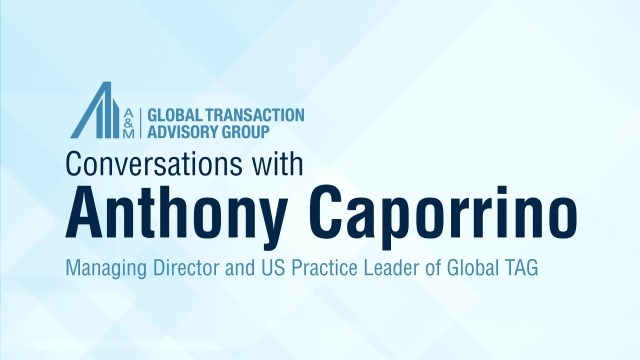CDMOs, Specialty Pharma Among Verticals Driving M&A Activity in Healthcare
Last year saw pharma M&A settle down into a slower pace as a result of macroeconomic uncertainty, rising interest rates and volatile capital markets, a trend that has continued into 2023. PE-led activity has struggled even more given the higher cost of debt, with PE investments in the European healthcare sector declining 27% in 2022, according to S&P Ratings[1]. One of the main reasons behind the slowdown has been the mismatch in pricing expectations between sellers and buyers, leading to several failed processes over the last two years.
However, this wider slowdown only tells one part of the story. We observe that appetite from both trade and financial buyers remains strong in certain sub-sectors within the healthcare & life science space, which could provide the backdrop for more dealmaking towards the rest of the year. Further supporting this is the fact that PE funds overall are still flush with cash and corporates continue to review their portfolio of assets driven by rising shareholder activism and changing market dynamics.
In particular, Contract Development & Manufacturing Organisations (CDMOs), biologics and specialty pharma are three verticals that we believe are well-suited to lead the way to more M&A activity. In this article, we explore the key drivers behind the growing interest in these areas, as well as latest trends and opportunities for investors within them.
Renewed focus on CDMOs as they embrace new therapeutical demands
CDMOs’ relevance and centrality to the global pharma ecosystem have grown significantly in recent years. Its increasing role was highlighted during the Covid crisis when CDMOs facilitated the rapid ramp up in vaccine production across the world. The global pharmaceutical contract manufacturing and research services market size was valued at USD 226.6 billion in 2022 and is expected to grow at a CAGR of 7.10% from 2023 to 2030.[2].
Against this background, CDMOs M&A continued apace in 2023 with PE buyers looking to buy their way into the buoyant sub-sector and incumbent players seeking to consolidate or broaden their capabilities. Industry-specific growth and competitive dynamics mean many deals are bucking the trend and commanding a premium in today’s tougher M&A market.
Historically, deal activity has been fuelled by decades-long trends in outsourcing, with big pharma continuously divesting assets to rationalise their manufacturing footprint and become asset-light businesses. More recently, the emergence of novel modalities, such as cell therapies and biologics, has become a major driving force. CDMOs are increasingly moving into these new areas to meet demand from biopharma specialists, requiring businesses to make internal investment and seek strategic M&A initiatives.
Examples of this trend include contract biopharma manufacturer Catalent, which has drawn buyout interest from life sciences group Danaher earlier this year, according to reports. Catalent, which has acquired several smaller businesses itself in recent years, has been investing heavily to strengthen its infrastructure in biologics and cell and gene therapy after enjoying a boost in Covid-related revenues.
In the PE space, GHO Capital Partners and Partners Group’s recent investment in Sterling Pharma Solutions illustrates the appetite for the sector. The deal saw Partners Group acquire a significant minority stake in the global CDMO company, while GHO retained a significant share and continues its journey with the management. Sterling is a specialist in the early-stage development of antibody drug conjugates, a fast-growing class of cancer treatments, as well as a complex small molecule API platform.
This follows from a number of deals in 2022, including the acquisition of CordenPharma, a CDMO focusing on complex and fast-growing drug modalities such as mRNA and peptides, by Astorg Partners for $2.6 billion. Other transactions include Inflexion’s minority investment into Proteros Biostructures, a German-based company focused on early-stage drug delivery, and GHO’s purchase of RoslinCT, a CDMO focused on advanced cell therapies, which was followed by an investment in Lykan Bioscience, creating a pan-Atlantic group.
For financial buyers playing in the lower middle market of healthcare, CDMO investments offer a rare opportunity to deliver returns through a buy-and-build approach in an otherwise rather consolidated space. It is estimated that the five top CDMO players hold just 15% of total market share, with hundreds of companies generating less than $50 million in annual revenues comprising the rest.
Sponsors might also invest with a view to grow the business via organic initiatives, including investment in talent, new technologies and building out of new, specialised capabilities.
Gaining a foothold in biologics through adjacent players
The pharma industry’s pivot towards biologics is another major transformation providing a range of opportunities for dealmakers. Biologics – which includes antibodies, immunosuppressants, anticancer as well as their biosimilars – are forecast to overtake innovative small molecules over the next five years in terms of revenues[3], as they become primary engine of value creation for pharma companies globally.
One noticeable trend we have observed is that, instead of taking bets on a single biopharma company, investors wanting to get exposure to biologics are increasingly eyeing “adjacent” assets that support businesses in the wider ecosystem.
Buyers are gravitating towards players serving the industry’s value chain, for example those offering the specialist logistics (such as cold chain), monitoring and packaging capabilities that are required to maintain the safety and efficacy of these cutting-edge drugs.
Recent deals include Hitachi Transport Systems’ acquisition of CyberFreight, a Dutch logistics provider specialised in highly sensitive, high-value pharmaceutical products, and EQT and Mubadala’s buyout of Envirotainer, a Swedish specialist for temperature-controlled containers used for transportation of temperature-sensitive healthcare products.
As the industry continues to mature and achieve commercial scale, businesses are exploring ways to reduce development and manufacturing costs, yielding opportunities for new tech-enabled providers that focus on business processes optimisation. Another way to play the growth in biologics is via players developing drug delivery technologies, including formulations that improve product stability and alternative administration routes (such as orals and others that don’t require the presence of a healthcare professional).
Overall, focusing on adjacent providers offer investors a chance to capitalise on the industry’s momentum without being exposed to the binary risks of trial outcomes. Whilst these businesses will likely require sophisticated technology and talent investments just as in core biologics assets, they can also allow investors to access high returns available in the sector without jumping into the deep end of the pool.
Specialty pharma businesses emerging as potential target area
Specialty pharmaceuticals have undergone a fundamental change in the past few years, moving away from small molecules and a business model that relied on aggressive price hikes. Instead, today’s growth agenda has largely shifted towards specific therapeutic areas, meaning low-volume drugs that treat complex and chronic conditions.
Many of these specialty drugs are biologics (large molecules based on living cells), which carry development and manufacturing challenges of their own, as previously mentioned in this article. Amidst this, several strategic players are increasingly looking for assets to build their niche platforms as well to develop the specialist capabilities needed to produce these drugs. Conversely, smaller specialty firms are ripe for investments as they often do not have the resources to bring their innovative drugs to the market.
Examples of recent deals in this space include HIG Capital’s acquisition of Aspire Pharma, a provider of niche generic and branded specialty pharmaceuticals that offer innovative formulations and supply arrangements in underserved markets. This was followed by an add-on acquisition of Morningside Healthcare and Morningside Pharmaceuticals in 2022.
Another trend in specialty pharmaceuticals is the use of public-to-private transactions. A recent example is the acquisition of Dechra Pharmaceutics, a global specialist in veterinary pharmaceuticals and related products including Vetoryl, a medicine for Cushing's disease in dogs, and Felimazole, a medication for treating feline hyperthyroidism. The business was acquired by EQT for £4.5 billion, one of the biggest buyouts in the UK this year.
How can A&M help?
A&M’s Healthcare Transaction Advisory team is dedicated to the business of healthcare. Our industry experience and expertise allow us to not only anticipate key financial accounting considerations in a transaction, but also provides context relative to key operational drivers. The result is an informed and quick assessment of deal issues that matter. Our findings are communicated in real-time as they become known and involve senior members of the team.
Our financial accounting due diligence professionals partner with A&M’s dedicated healthcare operations, tax, information technology and commercial due diligence teams to share information, leverage knowledge and report to you in a coordinated and integrated manner. We also provide data analytics services to clients to uncover maximum actionable insights to support their M&A, divestment or investment strategy.
Our integrated approach combines due diligence with performance improvement preparation. This includes identifying, quantifying and prioritising opportunities, focusing on operations and revenue enhancement to achieve targets as well as partnering with portfolio management team to deliver results. Some of our focus areas in performance improvement are business plan and business model, SG&A and operating model as well as sourcing & supply chain.
[1] https://www.spglobal.com/marketintelligence/en/news-insights/latest-news-headlines/behind-the-surge-in-take-privates-pe-investment-in-eu-healthcare-fades-74799512
[2] https://www.grandviewresearch.com/industry-analysis/pharmaceutical-contract-manufacturing-market
[3] https://www.europeanpharmaceuticalreview.com/news/171206/rise-of-biologics-set-to-continue-says-report/








